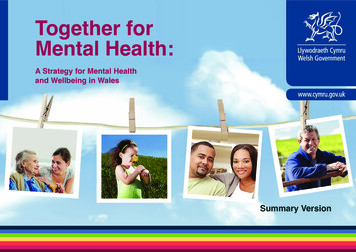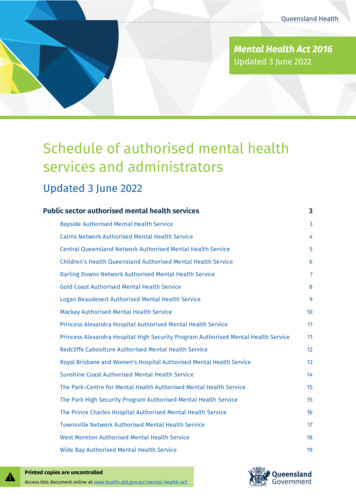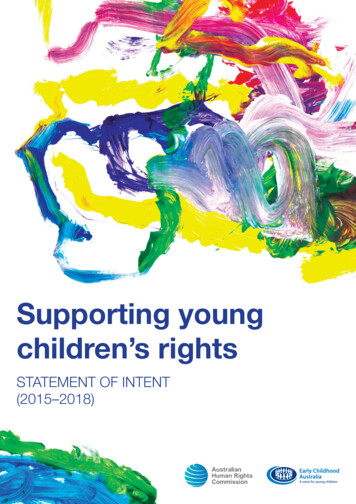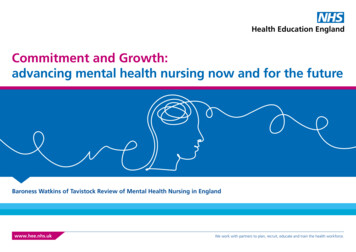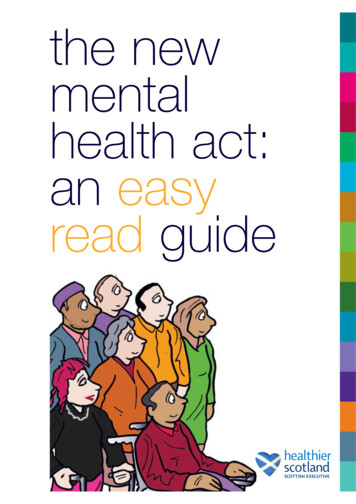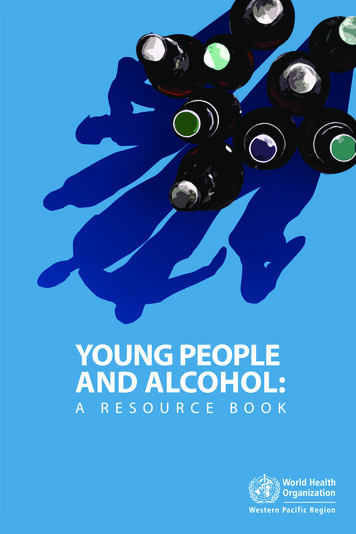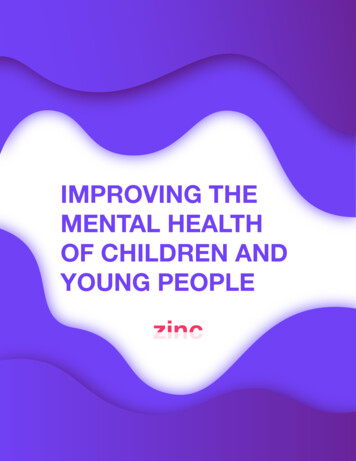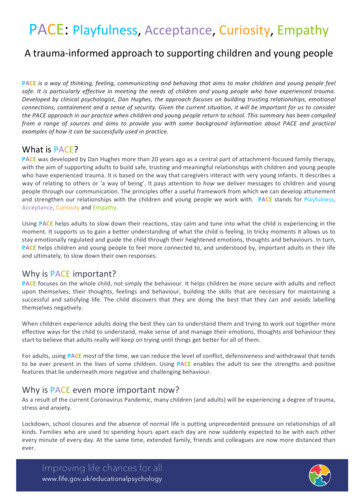
Transcription
Supporting YoungPeople’s Mental HealthEight Points for Action: A Policy Briefing from the Mental Health FoundationDr Moira FraserSusan Blishen
Supporting Young People’s Mental HealthAcknowledgementsAuthors:Dr Moira FraserSusan BlishenAdditional research:Sally SnowballJustin Pearce-NeudorfFabien DecodtsWith thanks to the young people and CAMHS professionals who contributed their views and experiences,and Kathryn Pugh (Young Minds).
Supporting Young People’s Mental Health 1IntroductionIt’s easy to hide how I’m feeling if I don’t feel I can talk to them or thatthey will understand or provide the right supportYoung personRates of mental health problems reported among children and young people have risen over the last fiftyyears1. Among teenagers, rates of anxiety and depression increased by 70% in the past 25 years2 and theincidence of reported self-harm has also risen, with one in 15 young people now thought to be affected3.Left unresolved, mental health problems significantly affect children and young people’s social andeducational development. This can have a profound and lasting negative impact into adult life in terms ofemployment, relationships, and likelihood of disability. Paradoxically, the time at which most help is oftenneeded- the period of transition from childhood into adulthood – is exactly the time at which services arecurrently least able to meet that need.This paper outlines key areas for the development of support for young people and their mental health,focusing in particular on adolescence and young adulthood (the 11-25 age range). Recommendations withinthis paper are informed by ten years of Mental Health Foundation work on children and young people’smental health, including the Listen Up! project4, which explored ways of providing person-centred supportto young people experiencing mental health difficulties.Why the mental health of young people mattersGood mental health is the foundation of young people’s emotional and intellectual growth, underpinningthe development of confidence, independence and a sense of self worth. Young people who are mentallyhealthy will have the ability to: Develop psychologically, emotionally, creatively, intellectually and spirituallyInitiate, develop and sustain mutually satisfying personal relationshipsUse and enjoy solitudeBecome aware of others and empathise with themPlay and learnFace problems and setbacks and learn from them5Enjoy and protect their physical healthMake a successful transition to adulthood in due courseConsequences of poor mental health in young peopleThere is growing evidence that some types of mental health problems are predictive of negative outcomeslater in life. For example, there is a strong, unfavourable relationship between childhood conduct disorder andsocial exclusion and poor inter-personal relationships, offending behaviour and erratic employment6.There is also a strong correlation between child and adolescent mental health issues and mental healthproblems in adulthood. In one study 50% of young adults with a mental health problem had been firstdiagnosed between the ages of 11 and 157.
Supporting Young People’s Mental Health2 The economic and social cost of failing to address the emotional problems faced by children and youngpeople is vast. It is estimated that the costs of public services used through to adulthood by individuals withtroubled behaviour as children are 10 times higher than for those with no significant problems8.Risk and protective factorsFactors or circumstances associated with the risk of children experiencing mental health problems includefamily structure (such as lone parent, reconstituted families, large families); educational attainment of parents,poverty and low socioeconomic status9.A Mental Health Foundation project identified four groups of young people as being particularly vulnerableto mental health problems. These groups were children with emotional and behavioural difficulties, homelessyoung people, looked after children and young offenders10. These groups are also less likely to have theirproblems diagnosed or to receive help to deal with them. Other groups recognised as vulnerable includeyoung carers, refugees and asylum seekers and young people with learning disabilities.It is clear that parenting style has a critical impact on children’s emotional and cognitive development. Keyprotective factors include feeling loved, trusted and understood, having interest in life, optimism, autonomy,self-acceptance, and resilience11. In addition, the school environment has been found to play a role. Wholeschool approaches to mental health promotion, and well-evidenced forms of anti-bullying strategies, forexample, have been found to be protective of children’s mental health.Further investment is needed in research to determine which interventions are most effective in reducingrisk factors and strengthening protective factors, and this research should underpin policy.
Supporting Young People’s Mental Health 3Policy backgroundRecent Government policy, spearheaded by Every Child Matters12, has placed increased focus on children’swellbeing and promoting mental health, with emphasis on early intervention and identification. LocalChildren and Young People’s Plans have been introduced to provide support for more integrated and effectiveservices. Strengthening health promotion in local communities and targeting resources to the neediestcommunities have been highlighted as priorities. Youth Matters13, the Governments’ strategy for youthpublished in March 2006 intends to build on this by empowering young people in shaping the servicesthey need, encouraging their involvement and supporting better choices. In addition, it pressed for a singlepoint of contact for young people experiencing difficulties. A further ten year strategy - Aiming high foryoung people14 – was published in July 2007, to promote involvement in positive leisure activities and thedevelopment of resilience and social and emotional skills.To integrate services for children, Children’s Trusts have been developed, which are supposed to be in placein every local authority by 2008. The process of integrating support and services is to be supported by acommon assessment framework, information sharing, a lead professional and common core competenciesfor those working with children.A substantial policy review of children and young people, published by HM Treasury and the Departmentfor Education and Skills in 2006, offered a sophisticated analysis of the factors that contribute towards goodmental health with the intention of feeding in to the 2007 Comprehensive Spending Review. Buildingresilience is a major theme and there is a welcome recognition of the importance of good social andemotional skills in helping to protect children and families from poor outcomes later in life. The review also setout a variety of measures and additional investment to improve support for parents and for families trapped ina cycle of low achievement.For services which seek to provide support and care for children and young people who need to use mentalhealth services, either at a universal or specialist level, it was clear that policy levers needed to be set in placeto drive development. To address this, the National Service Framework (NSF) for Children, Young People andMaternity services15 was published in 2004, describing the support which children and young people shouldexpect to be able to receive. Standard 9 of the NSF addressed the mental health and psychological wellbeingof children and young people. It stated that by 2014: “All children and young people from birth to theireighteenth birthday, who have mental health problems and disorder have timely access to timely, integrated,high quality, multi disciplinary mental health services to ensure effective assessment, treatment and support,for them and their families.”This meant that all levels - known as “tiers” - of Child and Adolescent Mental Health Services (CA
health services, either at a universal or specialist level, it was clear that policy levers needed to be set in place to drive development. To address this, the National Service Framework (NSF) for Children, Young People and Maternity services15 was published in 2004, describing the support which children and young people should


